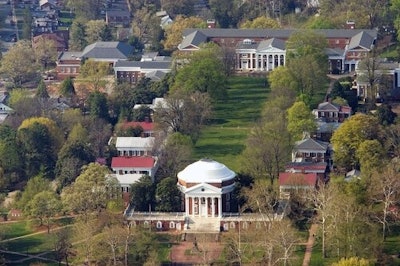 University of Virginia
University of Virginia
“Universities have done a terrible job for most of their existence of telling a real, truthful account of their history, and so we confuse myth and memory,” said Dr. Kirt von Daacke, professor of history and assistant dean of the College of Arts & Sciences at the University of Virginia (UVA), which is home to the international Universities Studying Slavery (USS) consortium. “These projects may be born in moments where we know we need to do something differently, but they are constant with the vision and mission of any university. We are here to create new knowledge. If we don’t do this work, we fail to live up to our vision as a university.”
Since around 2016, almost 100 colleges and universities in the U.S. and globally have joined the USS consortium. According to the network’s mission statement, “member schools are all committed to research, acknowledgement, and atonement regarding institutional ties to the slave trade, to enslavement on campus or abroad, and to enduring racism in school history and practice.”
As part of the consortium, von Daacke co-chaired the UVA President’s Commission on Slavery and the University. In 2018, that commission published a report on UVA’s connections to the slave trade, including the history of its founder Thomas Jefferson, who enslaved more than 600 people over his lifetime.
“We sit at a university where the man who wrote the Declaration of Independence also held hundreds of people in bondage and did very little to free those people, “ added von Daacke. “So, we have it all here: the democratic ideal as espoused in the Declaration as well as a university plantation landscape in one of the largest slaveholding states. It’s our students who stand up and say, we need to talk about this. We’re not being honest about our history. And what you find is that universities become much more honest and much more welcoming for a broader swath of people.”
In April of this year, Franklin & Marshall College (F&M), a private and predominantly white liberal arts college, became one of the newest members of USS. The college enrolls about 2,283 students, has roughly a $450 million endowment, and is in Lancaster, Pennsylvania. F&M is also named after Benjamin Franklin and John Marshall, both enslavers.
“Franklin and Marshall have been scrutinized about owning of slaves as part of their history, and that history has long been hidden, so our goal is to educate our community about it,” said Dr. Gretchel Hathaway, F&M’s first vice president for diversity, equity, and inclusion. “I want our youngsters to know the true story of how slaves were brought to America, how people made money off the backs of people they did not pay.”
With the college’s president, Dr. Barbara Altmann, Hathaway launched a Legacy of Slavery at F&M study group to look into the past of not only the college’s namesakes but the history of slavery around the college as well as the indigenous history of the land the college sits on. Soon after the group’s launch, F&M joined the USS consortium. A report on the group’s findings will likely be published at the end of this month.
“Much of our history as African Americans and a country is being removed now under people’s fear of so-called critical race theory, which is actually not even what critical race theory is,” said Hathaway. “I know folks talk about not wanting their child to feel guilty about the past, but it’s not about guilt. It’s about folks looking at what happened in a particular time so that we don’t make the same mistake twice. Let’s grow from our history. These colleges in the consortium are doing our country right.”
In August 2020, Texas Christian University (TCU) signed on to join USS, largely responding to the Black Lives Matter protests that summer as well as TCU’s recent past. In January 2020, a former Black TCU honors student filed a federal lawsuit against the institution, alleging a history of racial discrimination there. Last fall, TCU settled the lawsuit, but the terms were not disclosed.
“We often get in the way of the truth,” said Dr. Frederick Gooding, Jr., the Dr. Ronald E. Moore professor in humanities at TCU. “But I think that me telling you about the lawsuit, for example, is foundational to move the conversation forward. And if anything, it makes our story all the more important. We started in a period of angst, but I would be hot-dang if in two years we did not take steps toward healing.”
TCU launched the Race & Reconciliation Initiative (RRI) in the summer of 2020 to investigate and document its relationship with slavery, racism, and the Confederacy. RRI is in year two of a five-year plan. Gooding is the chair of RRI, though a new incoming chair will soon be announced. He said that joining the USS consortium was critical in learning from other institutions.
“Progress is a process,” said Gooding. “It is not instant oatmeal. It does not happen overnight. And oftentimes, we as professionals feel that burden to save the world. It took us some time to get here, and it may take us some time to move from this point. But I do pledge that we are doing the best we can do with what we got.”
Looking ahead with USS, von Daacke has been co-chairing UVA’s President’s Commission on the University in the Age of Segregation (PCUAS). Next week, UVA also relaunches an in-person, weeklong program for high schoolers called the Cornerstone Summer Institute, where students learn about UVA’s past and modern-day legacies of slavery.
“This is ongoing,” said von Daacke, echoing Gooding. “Juneteenth speaks to how we as a nation are still wrestling with what exactly it means to be included as a citizen in the American democratic project with this history and present.”
Rebecca Kelliher can be reached at [email protected].
















